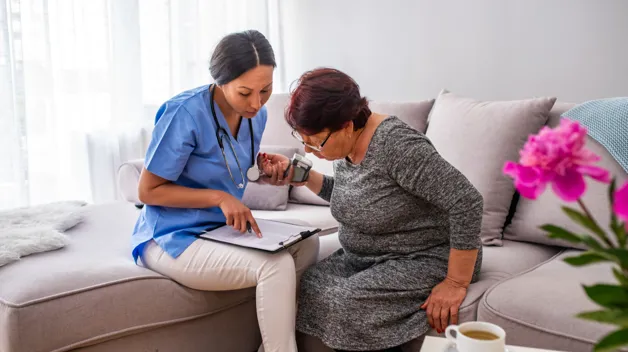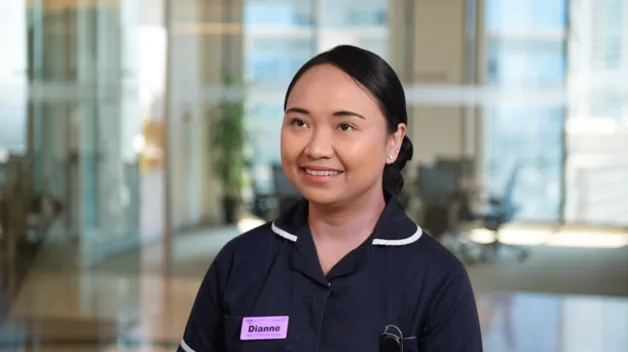Supportive care and advanced cancer

Reliable information and compassionate support for people living with advanced pancreatic cancer
Understanding supportive care
Supportive care, also called palliative care, is a specialised approach to care that focuses on managing symptoms, supporting emotional wellbeing, and helping with the practical challenges of living with a serious illness like pancreatic cancer.
It can begin at any point, including at the time of diagnosis, and is often provided alongside treatment such as chemotherapy or radiotherapy. Supportive care helps people feel more comfortable, more informed, and more able to focus on what matters most to them.
Support is available not only for you, but also for your carers and family members.
Supportive care is guided by your goals and values. Whether you’re managing physical symptoms, making decisions about treatment, or simply needing space to talk things through, your care team is there to walk alongside you.
Supportive care can begin at any point, including at diagnosis. It’s not limited to the final stages of life. In fact, early involvement often means:
-
More time to plan and prepare
-
Better control of symptoms from the outset
-
A stronger sense of support from the beginning
If you’re unsure whether supportive care is right for you now, your GP or health care team can help talk through your options.
Your care team may include doctors, nurses, social workers, dietitians, psychologists, and spiritual care workers. Together, they can support you with:
-
Pain, fatigue, nausea or bowel symptoms
-
Anxiety, low mood or emotional fatigue
-
Nutrition and enzyme support
-
Counselling or psychological care
-
Cultural and spiritual support
-
Planning ahead or making care decisions
-
Equipment, transport and respite support
Supportive care is flexible. It adapts to your needs as they change, helping maintain quality of life throughout any point of your care plan.

Where can I access supportive care?
Supportive care can be arranged in your home, a hospital or cancer centre, a palliative care unit or, through telehealth, especially in regional areas.
You can ask your GP, oncologist or nurse about accessing supportive care. Most public services are free, though there may be costs for medications or equipment.
Living with advanced pancreatic cancer
Advanced cancer usually means the cancer has spread beyond the pancreas, and surgery is not a treatment option.
You might hear your doctors use terms like locally advanced or metastatic. These describe how far the cancer has spread. While this may feel confronting, there are still treatments available to help ease symptoms and improve quality of life.
People with advanced pancreatic cancer may experience:
- Pain or discomfort (often in the abdomen or back)
- Fatigue or low energy
- Appetite loss or difficulty digesting food
- Weight loss
- Nausea or changes in bowel habits
- Jaundice
- Difficulty managing blood sugar levels
Your care team can support you with:
- Pain medication and symptom-specific treatment
- Pancreatic enzyme supplements
- Nutrition support to maintain strength
- Diabetes or blood sugar monitoring
- Palliative procedures, such as stents for bile duct obstruction
To explore practical advice and treatment options for managing symptoms like pain, fatigue, jaundice or digestion issues, visit our Managing Symptoms page.
While surgery is not typically an option for advanced pancreatic cancer, there are still treatments that may help ease symptoms or slow the cancer’s growth. These can include chemotherapy, radiation therapy, or targeted therapies.
Your doctor will explain what’s available for your situation. You can also visit our Treatments page for more in-depth information.
This stage of the illness can bring emotional changes. Some people feel anxious or withdrawn; others feel numb or uncertain. It’s common to need time and space.
Support is available through:
- Counsellors or psychologists
- Specialist nurses and GPs
- Peer support groups or helplines
These services are also available to carers and family members.
Living with advanced cancer involves ongoing changes, but many people continue doing what’s meaningful to them in ways that feel manageable.
Supportive care can help you:
- Plan your week around energy levels
- Stay active with light movement
- Manage nutrition with tailored advice
- Access help at home, including nursing, transport or equipment
If your needs increase, your team can help coordinate additional support or explore other care options.
Supportive care is about protecting your quality of life, not just treating illness.
Having clear, reliable information can help reduce stress. Your care team can guide you through decisions, explain what to expect, and ensure you have access to the right services at each stage.
You don’t need to manage everything at once. You can take things one step at a time, supported by people who understand the path ahead.
Supportive care in practice
Once you understand what supportive care offers, it’s helpful to know how it works day to day, who provides it, how it’s arranged, and what to expect as your needs change.
Supportive care is designed to be flexible. It adapts to your individual circumstances, goals and preferences.You might engage with just one service or be supported by a team working together across different areas of care.
Supportive care is usually coordinated by a multidisciplinary team of health professionals who bring different expertise to your care plan. Depending on your needs, this may include:
- Your GP, who helps manage ongoing care and referrals
- Palliative care doctors or nurses, with expertise in symptom relief
- Oncologists, who may still be involved in active treatment
- Dietitians, psychologists, or social workers
- Occupational therapists or physiotherapists
- Spiritual care workers or cultural liaison officers, if relevant to your care
You may receive care at home, in hospital, via outpatient clinics or by telehealth. Your care team will help coordinate these services based on what’s most appropriate for your situation.
Supportive care is designed to fit around your life. Whether you’re receiving care at home, in hospital, or through remote services, your team will help make sure it’s accessible and aligned with your needs.
You don’t have to organise it on your own. Your doctor or nurse can explain what’s available in your area and what might be suitable for you. Visit Palliative Care Australia for more information.
Start by speaking with:
- Your GP - who may already be coordinating parts of your care
- Your oncologist or nurse - who can refer you to hospital or community-based services
- A palliative care team - if you’ve already been referred to one
In many cases, a referral is required, but your team will assist with the process. Most public services are free or low-cost, though there may be fees for specific supports or equipment.
Advance care planning
Advance care planning gives you the opportunity to think about what matters most if you become seriously unwell and are unable to communicate your preferences.
It’s a way to make sure your values and wishes are known — and can guide your care if there comes a time when decisions need to be made on your behalf.
Planning ahead can also reduce stress for your loved ones, giving them clarity and confidence about what you want.
There are two main parts to advance care planning:
-
Appointing a substitute decision-maker
This is someone you trust to speak on your behalf about medical decisions, if you are unable to. They can be a partner, family member or friend, and must be over 18 and willing to take on the role. -
Writing an Advance Care Directive
This is a document that outlines your values, preferences and instructions about future care. It is used only if you are unable to communicate. Once completed, it should be shared with your GP, care team and substitute decision-maker, and uploaded to your My Health Record if possible.
An Advance Care Directive is considered a legal document. In most cases, it does not require a solicitor, but each state and territory has different forms and requirements.
You can talk to:
- Your GP
- Your care team (including your nurse or specialist)
- A social worker or advance care planning service
For forms, guidance and state-specific resources, visit Advance Care Planning Australia.
Helpful questions to ask your doctor or care team
- What supportive care services are available to me right now?
- Who will be part of my care team, and how do they work together?
- How can I manage symptoms like pain, fatigue or appetite loss?
- Are there services that support my emotional or spiritual wellbeing?
- Can I get help at home or through telehealth?
- How do I start planning ahead for future care decisions?
- Where can I find local supportive care services?

Contact Dianne, Support Navigator
on 1800 003 800 for information and find out about the services and support that may be available for you and your family.
Always consult your doctor or health professional about any health-related matters. Pankind does not provide medical or personal advice and is intended for general informational purposes only. Read our full Terms of Use.
Thank you to the clinicians, researchers, patients, and carers who have helped us create and review our support resources, we could not have done it without you.
